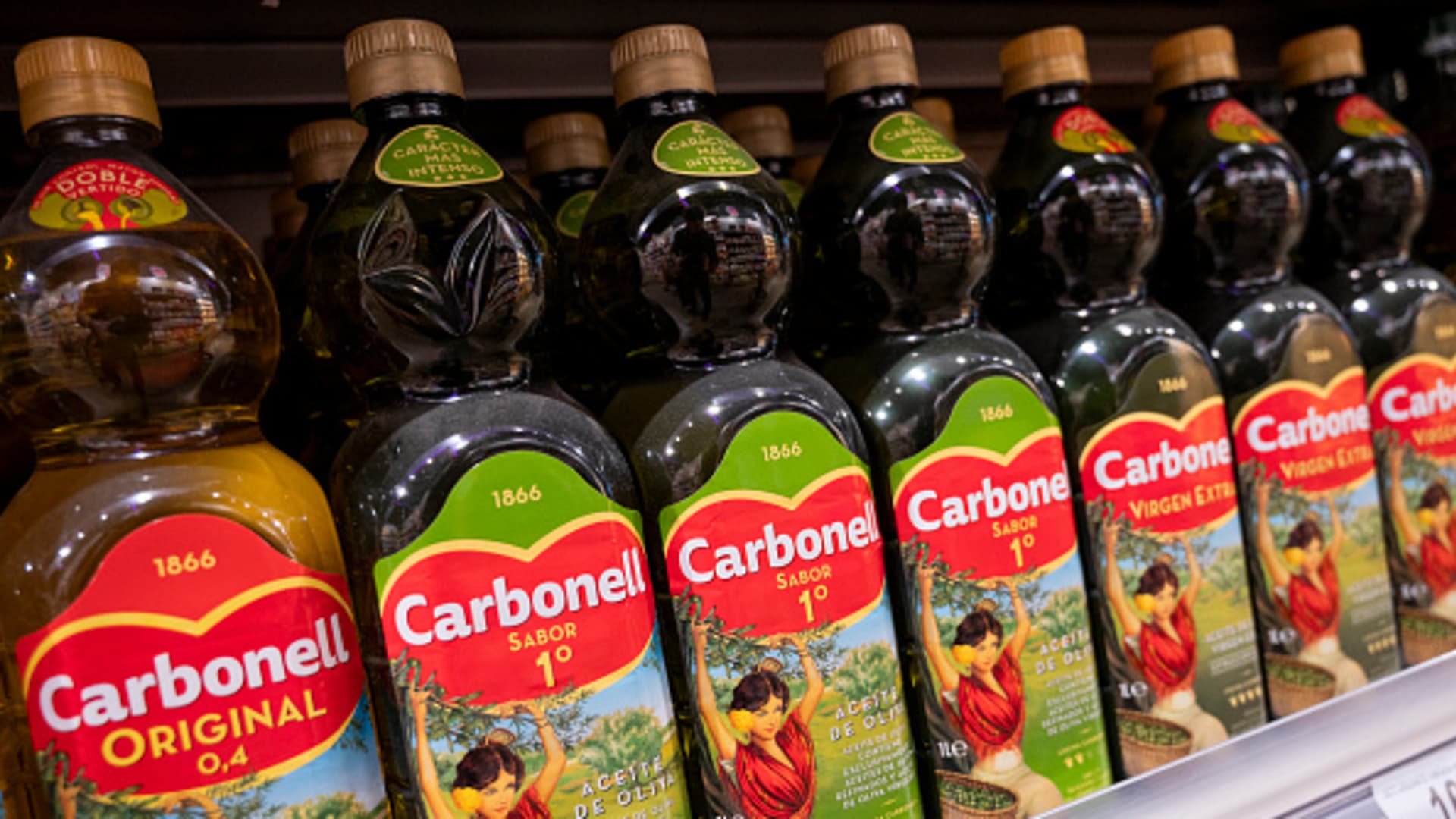Extreme hot weather and persistent drought conditions have dealt a severe blow to olive oil production in southern Europe, resulting in a significant surge in prices.
Anadolu | Anadolu | Getty Images
Spain’s Deoleo, the world’s largest olive oil producer, says the industry needs to undergo a “profound transformation” as it grapples with one of the most challenging moments in its history.
A perfect storm of climate change, soaring prices, high interest rates and robust inflation has taken its toll throughout the olive oil value chain in recent months.
Two consecutive years of scorching heat in Spain have limited olive harvests, culminating in an unprecedented price rally that has stunned consumers and industry veterans alike.
Spain accounts for more than 40% of the world’s olive oil production, making it a global reference for prices.
“We are facing one of the most difficult moments in the history of the sector,” Miguel Angel Guzman, chief sales officer at Deoleo, told CNBC via email.
“Strong inflation along with high interest rates and unfavourable olive oil harvest forecasts (in terms of quantity and quality due to the drought cycle) has caused prices to increase considerably,” Guzman said.
Extra virgin olive oil prices in Spain’s Andalusia hit a record high of 9.2 euros ($9.84) per kilogram in January. They were trading around 7.8 euros as of April 19, according to Mintec’s benchmark index, down from around 8 euros at the end of March.
Olive oil prices have cooled due in part to an uptick in production estimates and beneficial rains in March and April.
Bottles of Bertolli branded olive oil on a conveyor on the production line at the Deoleo SA plant Cordoba, Spain, on Friday, Nov. 11, 2022.
Bloomberg | Bloomberg | Getty Images
Deoleo, the maker of household olive oil brands such as Bertolli and Carbonell, said it was convinced the current situation was cyclical and expects a return to a “more reasonable price situation” when future harvest yields return to normal.
Yet, while the recent rain in Spain was “undoubtedly positive news,” the company struck a cautious tone on the outlook for olive oil prices.
“We still have months ahead of us until we know the possible volumes of the 2024/2025 harvest and until that moment, these movements will be punctual and prices will continue to be volatile,” Guzman said.
“In the meantime, the sector needs a profound transformation. Changes that from Deoleo we have been addressing with a firm commitment to best practices in terms of sustainability, innovation and quality, with a focus on the consumer.”
Olive oil sector must ‘take the reins’
Most of the world’s supply of olive oil comes from the Mediterranean, with southern European countries such as Spain, Italy and Greece among the world’s leading producers of the precious commodity.
Oilseeds analysts have warned that olive trees are “exceedingly” vulnerable to the climate crisis. Although they can typically cope with high temperatures and are fairly drought tolerant, the recent conditions have been too much.
Deoleo said the droughts and high temperatures during critical phases of olive fruit development in recent years have led to severe shortages in Spanish harvests — and the broader olive oil sector is “by nature an industry affected by the high volatility of prices at origin.”
Extreme hot weather and persistent drought conditions have dealt a severe blow to olive oil production in southern Europe, resulting in a significant surge in prices. The effects of these adverse climate conditions have been particularly pronounced in the European Union (EU), where countries collectively account for a staggering two-thirds of global olive oil production, alongside a substantial 900,000 tons of table olives.
Anadolu | Anadolu | Getty Images
The company said prices at origin represent up to 80% of its total costs, adding that this is “a situation we must address, especially in a context such as the current one.”
Asked what can be done to better protect olive trees from climate-fueled extreme weather, Deoelo’s Guzman said: “The sector has to take the reins and all the actors that are part of it must transform if we want to reduce price volatility and increase its predictability.”
He added: “This will be key to prevent external factors, with a greater or lesser impact on supply and demand, from having such a decisive impact on the price of the product and, consequently, on the actions that companies are forced to take as well as on the future of the category.”







